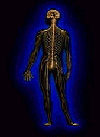A Journey Through Life with Multiple Sclerosis |
|||||
The Disease |
|||||
| "What is Multiple Sclerosis, anyway?" | |||||
Multiple=many Sclerosis=Scarring
The cord is coated so that the electricity will follow only the paths it is supposed to follow. What happens if you have a damaged cord? You don't use it or you replace it because if the wires inside that cord are layed bare the electricity will not follow the path of the cord and the discharge of electricity occurs in places other than intended. Think of the covering of the electric cord as myelin and the wire inside the cord as your nerve cells, carrying impulses (as the electric cord carries electricity) to your body.
Since there are billions of nerve cells in your body, that's a lot of different symtoms that can occur and a lot of areas that can be affected. Depending on which nerves are affected you will see different symptoms - different areas of the body affected. Although Multiple Sclerosis is not hereditary, there is a slightly higher incidence among family members. The cause remains unknown today. |
|||||



